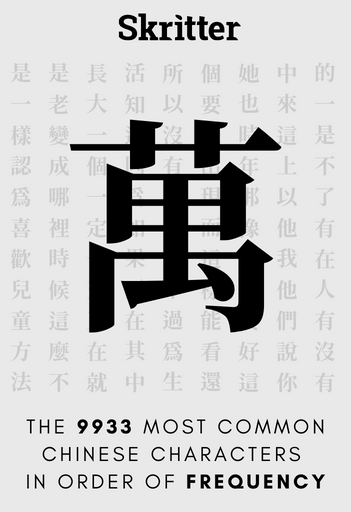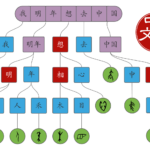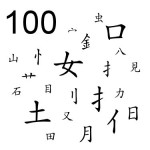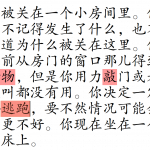
[ad_1]
Lists are good. They make the world appear extra orderly and manageable. Ticking one thing off a listing feels good, and once you’ve labored your means via the entire record, you recognize that you just’ve completed one thing. Progress!
No surprise that college students love learning lists, starting from official HSK lists, vocabulary lists from customary textbooks, or simply random record of attention-grabbing or helpful characters or phrases discovered on-line.
However a language is a posh system for communication, not only a record of vocabulary, so decreasing it to that may be harmful. Lists make the language appear orderly and manageable, however that is an phantasm!
Tune in to the Hacking Chinese language Podcast to take heed to the associated episode:
Obtainable on Apple Podcasts, Google Podcasts, Overcast, Spotify, YouTube and plenty of different platforms!
On this article, I’ll talk about professionals and cons with utilizing lists for studying Chinese language. As we’ll see, lists may be helpful, however some lists are extra helpful than others, and so they should be utilized in the suitable means!
Why utilizing vocabulary lists to study Chinese language is a good suggestion
First, let’s take a look at why you may wish to use lists for studying new characters and phrases:
 Lists are simple to seek out and entry – There are extra vocabulary lists on-line than you possibly can presumably make use of in your life learning Chinese language. Discovering these phrases manually might take a really very long time. Some lists are of very prime quality, with audio recordings and pictures, which might be onerous to copy by yourself. The identical may be stated for lists of the most typical elements, characters and phrases, which let you concentrate on probably the most helpful content material first.
Lists are simple to seek out and entry – There are extra vocabulary lists on-line than you possibly can presumably make use of in your life learning Chinese language. Discovering these phrases manually might take a really very long time. Some lists are of very prime quality, with audio recordings and pictures, which might be onerous to copy by yourself. The identical may be stated for lists of the most typical elements, characters and phrases, which let you concentrate on probably the most helpful content material first. Lists restrict your choices and aid you focus – A listing is ordered in a transparent means and the duty forward of you is obvious: simply work your means via the record. You might want to make few selections after getting chosen the record. Evaluation paralysis is an actual problem, so not having to waste time contemplating what to do subsequent is nice. There are at all times extra lists to proceed with after you’ve completed the one you’re engaged on now, too.
Lists restrict your choices and aid you focus – A listing is ordered in a transparent means and the duty forward of you is obvious: simply work your means via the record. You might want to make few selections after getting chosen the record. Evaluation paralysis is an actual problem, so not having to waste time contemplating what to do subsequent is nice. There are at all times extra lists to proceed with after you’ve completed the one you’re engaged on now, too. Lists make progress measurable – If you use lists, it’s simple to see what number of characters and phrases you may have learnt, which is very motivating. Ending a listing and shifting to the subsequent is like ticking an enormous, psychological checkbox, telling your mind that you just’re doing nicely. Evaluate this to another, extra obscure studying exercise the place you don’t really feel or see progress in any respect except you’re a newbie. That is an particularly significant issue when you’ve reached the intermediate plateau.
Lists make progress measurable – If you use lists, it’s simple to see what number of characters and phrases you may have learnt, which is very motivating. Ending a listing and shifting to the subsequent is like ticking an enormous, psychological checkbox, telling your mind that you just’re doing nicely. Evaluate this to another, extra obscure studying exercise the place you don’t really feel or see progress in any respect except you’re a newbie. That is an particularly significant issue when you’ve reached the intermediate plateau. Lists are handy to evaluation – Most flashcards apps, resembling Anki, Skritter or Pleco, have a characteristic the place you possibly can research lists created by others. With a couple of clicks, yow will discover all kinds of vocabulary lists and add lots of and even 1000’s of phrases. These apps then allow you to evaluation these phrases over time, ensuring that they stick, which requires a lot much less effort than maintaining monitor of attention-grabbing phrases you encounter right here and there.
Lists are handy to evaluation – Most flashcards apps, resembling Anki, Skritter or Pleco, have a characteristic the place you possibly can research lists created by others. With a couple of clicks, yow will discover all kinds of vocabulary lists and add lots of and even 1000’s of phrases. These apps then allow you to evaluation these phrases over time, ensuring that they stick, which requires a lot much less effort than maintaining monitor of attention-grabbing phrases you encounter right here and there. Lists cut up the language into manageable chunks – Studying phrases, characters and even elements lets you sort out the language one small unit a time. Studying textual content or listening to flowing speech is tough; studying the constructing blocks makes it simpler. As talked about above for measurable progress, smaller chunks additionally offer you a way of accomplishment.
Lists cut up the language into manageable chunks – Studying phrases, characters and even elements lets you sort out the language one small unit a time. Studying textual content or listening to flowing speech is tough; studying the constructing blocks makes it simpler. As talked about above for measurable progress, smaller chunks additionally offer you a way of accomplishment.- Lists acquire associated phrases and make the simple to entry – If you wish to brush up in your pc vocabulary in Chinese language or discover phrases associated to sports activities, yow will discover a listing of phrases that cowl these matters. That is considerably quicker than studying and listening a lot that you may acquire these phrases your self.
Every of those are legitimate causes for utilizing lists indirectly, and I feel that mixed, they account for the majority of the reason as to why college students of Chinese language (and different languages, after all) are inclined to depend on lists so much.
However that doesn’t imply that it is best to use them on a regular basis or that there aren’t issues related to utilizing lists. There’s a good quantity of analysis into vocabulary acquisition associated to lists, and even when it doesn’t unanimously discard lists as a supply for vocabulary, lists aren’t pretty much as good as you may suppose. Let’s flip the above professionals round and see how they’ll truly even be cons.
Why utilizing vocabulary lists isn’t such a good suggestion in any case
As I stated within the introduction, a language is a posh system for communication. It might be naïve to suppose that you might grasp Chinese language just by learning lists of characters and phrases, however even when few college students suppose that’s the case, many act as if it had been no less than partly true. In case your Chines weight-reduction plan consists principally of HSK vocabulary lists and check preparation, then you definately’re lacking each extra enjoyable and extra helpful strategies!
Right here’s the opposite aspect to the above benefits:
 Lists are simple to seek out and simple to entry… however how are you aware that you just’ve discovered the suitable record? The truth that yow will discover and use lists simply by looking on-line doesn’t essentially imply that the lists you discover are appropriate for you or that they’re of top of the range. For instance, a frequency record based mostly on newspaper textual content will not be appropriate for enhancing vocabulary for spoken language. Or a listing compiled by one other newbie based mostly on a textbook with unhealthy translations will not be the very best supply for brand new vocabulary both. Studying all radicals is a waste of time, however studying the most typical 100 is a superb concept. All of it relies upon.
Lists are simple to seek out and simple to entry… however how are you aware that you just’ve discovered the suitable record? The truth that yow will discover and use lists simply by looking on-line doesn’t essentially imply that the lists you discover are appropriate for you or that they’re of top of the range. For instance, a frequency record based mostly on newspaper textual content will not be appropriate for enhancing vocabulary for spoken language. Or a listing compiled by one other newbie based mostly on a textbook with unhealthy translations will not be the very best supply for brand new vocabulary both. Studying all radicals is a waste of time, however studying the most typical 100 is a superb concept. All of it relies upon. Lists limits your choices and aid you focus… however aren’t you simply ignoring the issue? Not having too many selections is sweet as a newbie; you want steerage. Nevertheless, since studying Chinese language is a posh activity with many issues to do that may be finished in many various methods, hiding throughout the confines of a vocabulary record received’t actually assist; you’re simply ignoring the complexity of the issue. When you actually belief the individual making the alternatives for you and so they know of your state of affairs, motivation and targets, you is perhaps high quality, however most likely not. For instance, even the official HSK lists comprise a number of ineffective phrases, omissions and different oddities. The identical goes for the TOCFL lists.
Lists limits your choices and aid you focus… however aren’t you simply ignoring the issue? Not having too many selections is sweet as a newbie; you want steerage. Nevertheless, since studying Chinese language is a posh activity with many issues to do that may be finished in many various methods, hiding throughout the confines of a vocabulary record received’t actually assist; you’re simply ignoring the complexity of the issue. When you actually belief the individual making the alternatives for you and so they know of your state of affairs, motivation and targets, you is perhaps high quality, however most likely not. For instance, even the official HSK lists comprise a number of ineffective phrases, omissions and different oddities. The identical goes for the TOCFL lists. Lists make progress measurable… however are you measuring the suitable factor? – I imagine that measurable progress is nice, however as quickly as you begin measuring, it’s good to watch out that you just’re measuring the suitable factor. You’re, in any case, attempting to study Chinese language, not solely Chinese language characters and phrases. I’ve written two articles about this downside already: The significance of counting what counts when studying Chinese language and Measurable progress is a double-edged sword. Sure, you’re making a whole lot of progress should you measure what number of phrases you possibly can deal with in your flashcard app, however does that imply that you should utilize them? Even should you might, is that equal to proficiency? Probably not. Focusing solely on lists can be a bit like going to the health club to get stronger in roder to develop into higher at basketball, however then by no means actually depart the health club.
Lists make progress measurable… however are you measuring the suitable factor? – I imagine that measurable progress is nice, however as quickly as you begin measuring, it’s good to watch out that you just’re measuring the suitable factor. You’re, in any case, attempting to study Chinese language, not solely Chinese language characters and phrases. I’ve written two articles about this downside already: The significance of counting what counts when studying Chinese language and Measurable progress is a double-edged sword. Sure, you’re making a whole lot of progress should you measure what number of phrases you possibly can deal with in your flashcard app, however does that imply that you should utilize them? Even should you might, is that equal to proficiency? Probably not. Focusing solely on lists can be a bit like going to the health club to get stronger in roder to develop into higher at basketball, however then by no means actually depart the health club. Lists are handy to evaluation … however are you studying the phrases correctly? Many college students, together with myself, undergo some interval the place they binge on new vocabulary, recklessly importing numerous lists into the flashcard program of their selection. Nevertheless, whereas it’s handy, I’ve discovered that I seldom study these phrases as totally as those who I add or edit manually myself. Studying will not be at all times handy. Deep processing requires effort and focus. Your flashcards will solely cowl a small a part of what it means to know a phrase.
Lists are handy to evaluation … however are you studying the phrases correctly? Many college students, together with myself, undergo some interval the place they binge on new vocabulary, recklessly importing numerous lists into the flashcard program of their selection. Nevertheless, whereas it’s handy, I’ve discovered that I seldom study these phrases as totally as those who I add or edit manually myself. Studying will not be at all times handy. Deep processing requires effort and focus. Your flashcards will solely cowl a small a part of what it means to know a phrase. Lists cut up the language into manageable chunks … however phrases don’t exist in a vacuum! That is in truth one of many main disadvantages with studying vocabulary in isolation, resembling from a listing. As I stated above, a language is extra than simply vocabulary. You’ll be able to’t simply pile phrases randomly on high of one another and hope that they make sense. Realizing a phrase is about a lot greater than the definition, resembling the way it’s used (which may be advanced), register, connotations and so forth. You merely received’t get this from a listing, irrespective of how good it’s. You’ll solely get that via intensive studying and listening.
Lists cut up the language into manageable chunks … however phrases don’t exist in a vacuum! That is in truth one of many main disadvantages with studying vocabulary in isolation, resembling from a listing. As I stated above, a language is extra than simply vocabulary. You’ll be able to’t simply pile phrases randomly on high of one another and hope that they make sense. Realizing a phrase is about a lot greater than the definition, resembling the way it’s used (which may be advanced), register, connotations and so forth. You merely received’t get this from a listing, irrespective of how good it’s. You’ll solely get that via intensive studying and listening.- Lists acquire associated phrases… however this makes them simpler to confuse! There’s loads of analysis that reveals that studying phrases which have associated meanings, resembling twenty kinds of fruit or all the colors in a language, makes it considerably tougher to recollect the phrases. That is due to interference between the phrases. Usually talking, should you study two related issues on the similar time, will probably be tougher to untangle them from one another later. Nevertheless, evaluating related phrases can nonetheless be helpful should you already know the phrases (see e.g. Nation, 2000).
As we will see, studying immediately from a vocabulary record has sure drawbacks. You will get round a few of them by utilizing rigorously curated content material, having a reliable instructor and being an unbiased learner who is aware of concerning the potential pitfalls. My hope is that this text has helped you in direction of turning into extra conscious of the issue.
Vocabulary lists can nonetheless be helpful
I don’t imply to say that it is best to by no means study vocabulary from a listing. In reality, in most apps that rely closely on phrase lists, resembling Skritter, you aren’t meant to make use of the apps in isolation. When you’re learning a textbook anyway, having all of the phrases already added to a flashcard app is superior and saves a lot time! The identical goes for a graded reader you’re going via. Naturally, you may wish to add or take away phrases from the official record, however modifying an present record continues to be higher than creating every part by yourself from scratch.
After I say that you just shouldn’t study characters and phrases from a listing, I imply that should you’re seeing them for the primary time in that record, you’re doing one thing fallacious. There are circumstances the place lists are a reliable supply of latest vocabulary, although, however these are restricted. A superb instance can be once you wish to plug gaps in your vocabulary on a degree considerably decrease than your present one, or as preparation for listening or studying apply that might in any other case be too tough.
If I shouldn’t study vocabulary from a listing, how do I do know what to study?
As now we have seen, record shouldn’t be the primary supply of latest vocabulary. Basically, should you really feel that you just don’t have sufficient phrases to study, you aren’t listening and studying sufficient. In case you have sufficient phrases to study, however don’t know which to study first, you possibly can usually depend on both their significance for you personally (should you suppose the phrase is necessary, it most likely is) or their frequency within the sort of Chinese language you interact with (solely study issues that seem usually). I’ve written extra about which phrases it is best to study and the place to seek out them right here:
Which phrases it is best to study and the place to seek out them
There’s way more to say about completely different sorts of lists, particularly frequency lists, which I’ve talked about right here: Vocabulary lists that aid you study Chinese language and use them
Vocabulary lists that aid you study Chinese language and use them
References and additional studying
Folse, Ok. S. (2004). Myths about educating and studying second language vocabulary: What latest analysis says. TESL reporter, 37, 13-13.
Nation, P. (2000). Studying vocabulary in lexical units: Risks and tips.
Papathanasiou, E. (2009). An investigation of two methods of presenting vocabulary. ELT journal, 63(4), 313-322.
Schmitt, N. (2008). Instructed second language vocabulary studying. Language educating analysis, 12(3), 329-363.
Webb, S., & Nation, P. (2017). How vocabulary is discovered. Oxford College Press.
Suggestions and tips for study Chinese language immediately in your inbox
I have been studying and educating Chinese language for greater than a decade. My aim is that will help you discover a means of studying that works for you. Signal as much as my e-newsletter for a 7-day crash course in study, in addition to weekly concepts for enhance your studying!
[ad_2]
